#william f. buckley jr
Text
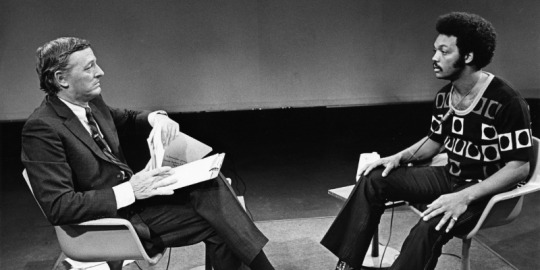
Picture this: a documentary about one of the most prominent figures in the 20th century
Someone who dedicated their life to fighting against the Ku Klux Klan. Now imagine watching that documentary and realizing that it completely glosses over the evil nature of the KKK and according to The Library of Congress was in sympathy with the Democratic party. Seems absurd, right? Well, that’s exactly what has happened with a recent PBS documentary on William F. Buckley Jr.
William F. Buckley Jr. was a towering intellectual and conservative commentator who vehemently opposed the KKK and its racist ideology. He used his platform to denounce their hate-filled rhetoric and stood up for racial equality. It’s baffling that a documentary about his life would choose to ignore the very evil he fought against. By omitting any mention of the KKK’s evil, this documentary fails to provide a comprehensive understanding of Buckley’s work and beliefs.
One of the most glaring misrepresentations in the documentary is the omission of Buckley’s commitment to intellectual diversity. Throughout his career, Buckley was known for engaging with individuals from all walks of life, regardless of their political beliefs. He prioritized thoughtful debate and intellectual discourse, seeking to challenge and be challenged by opposing viewpoints. Yet, PBS seems to conveniently ignore this aspect of Buckley’s legacy, instead choosing to present him as a rigid ideologue.
The documentary, titled “Buckley: A Legacy Reimagined,” paints a rather one-dimensional picture of Buckley, reducing him to a mere caricature of conservative ideology. It fails to delve into the nuanced arguments and intellectual depth that made Buckley such a formidable force in the conservative movement. A documentary should strive to present an accurate portrayal of its subject, shedding light on both their achievements and the challenges they faced.
0 notes
Text
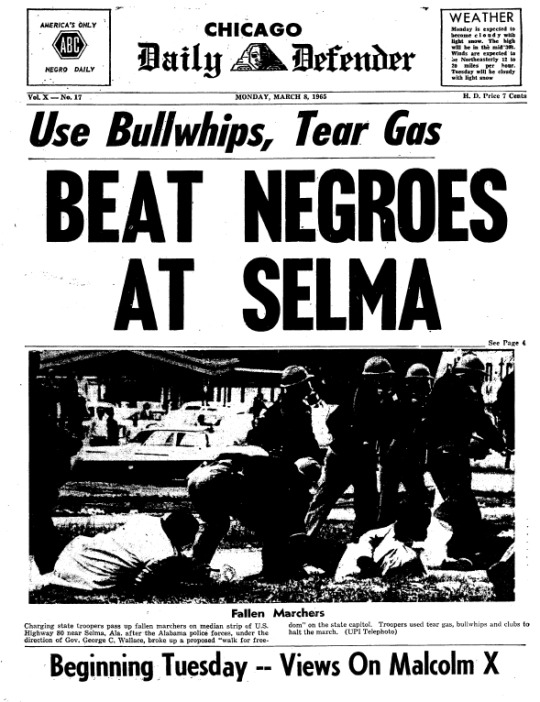


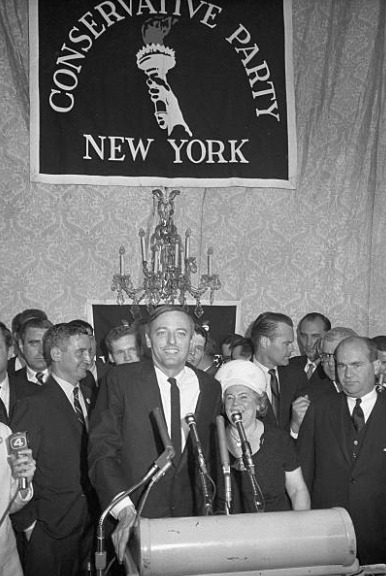
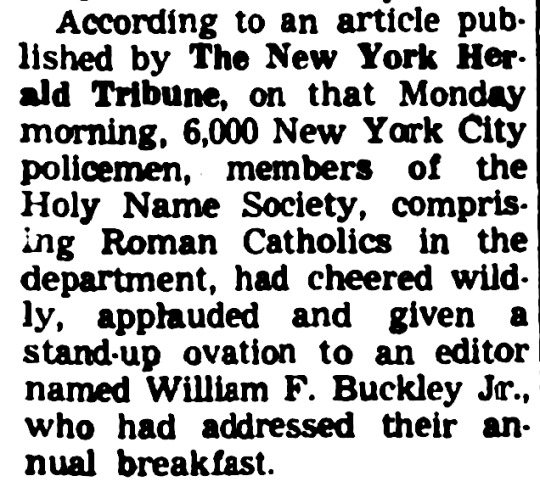

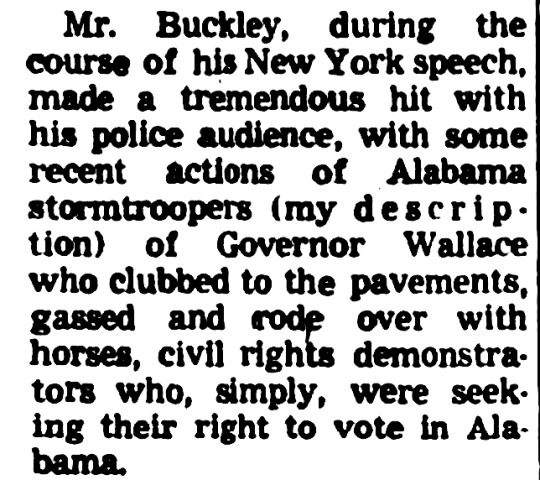

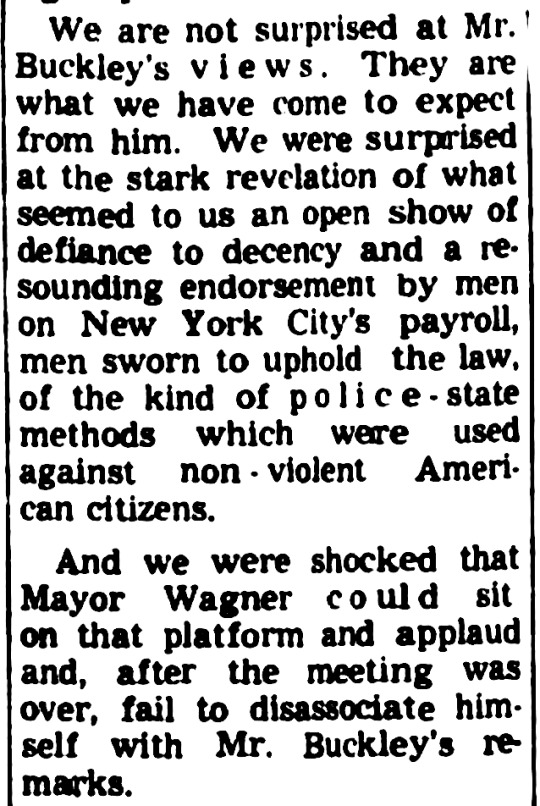
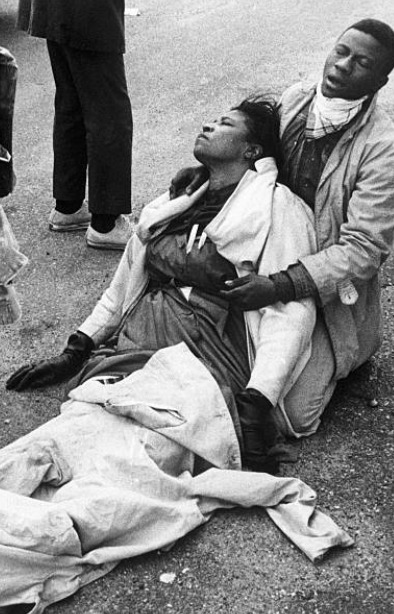
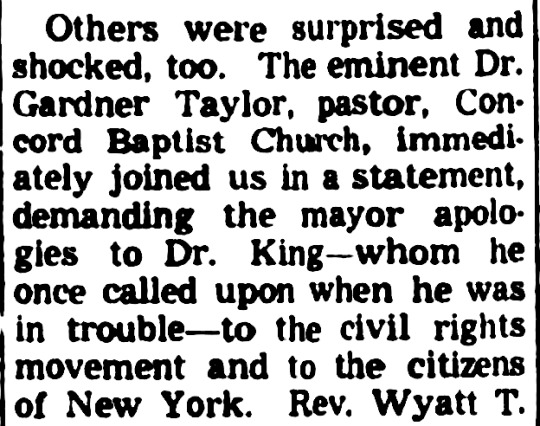

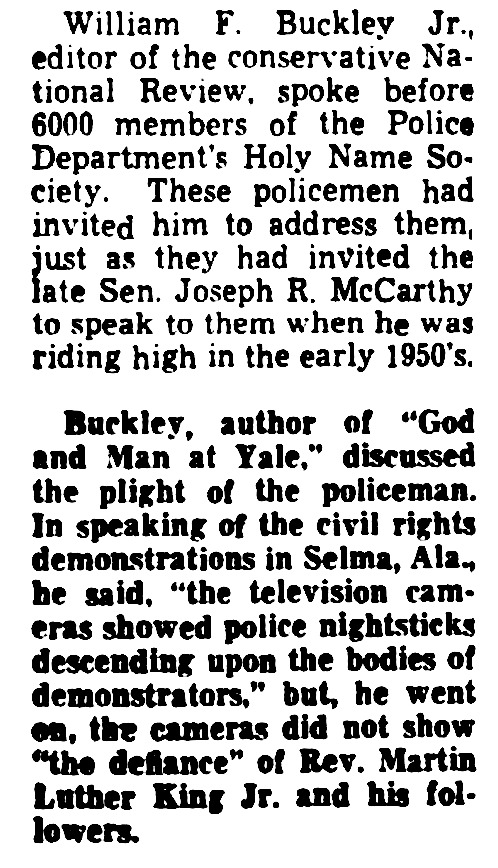

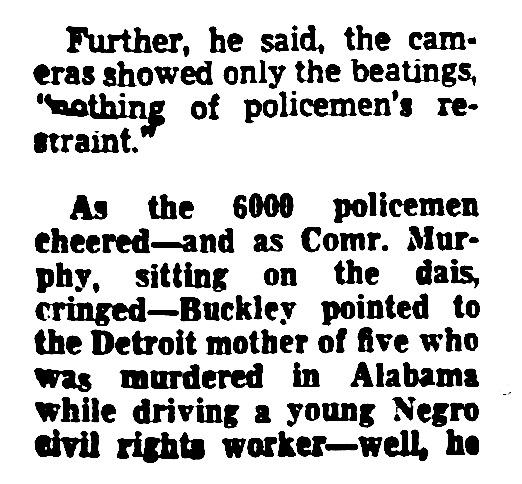



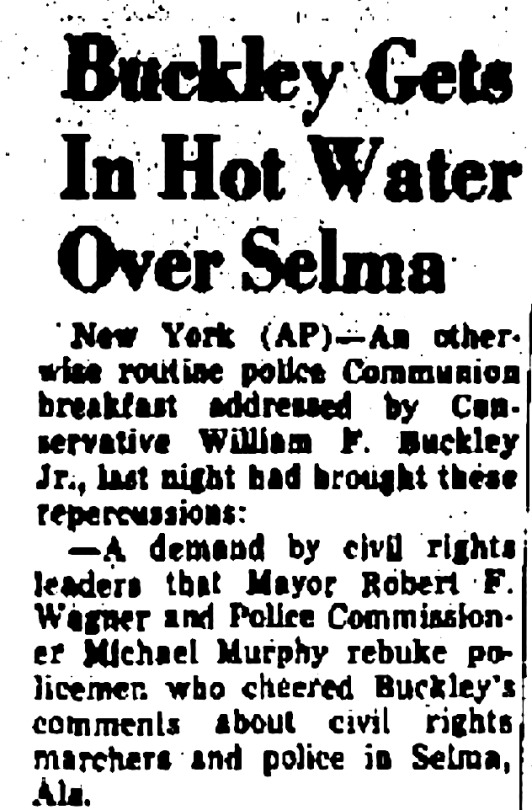
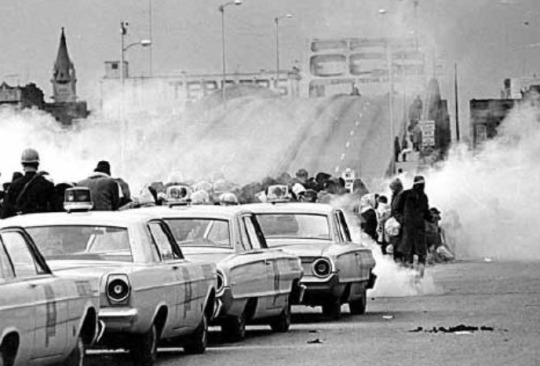
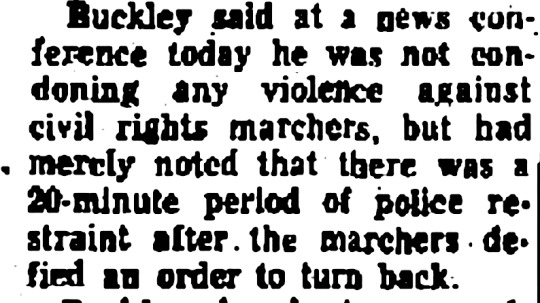

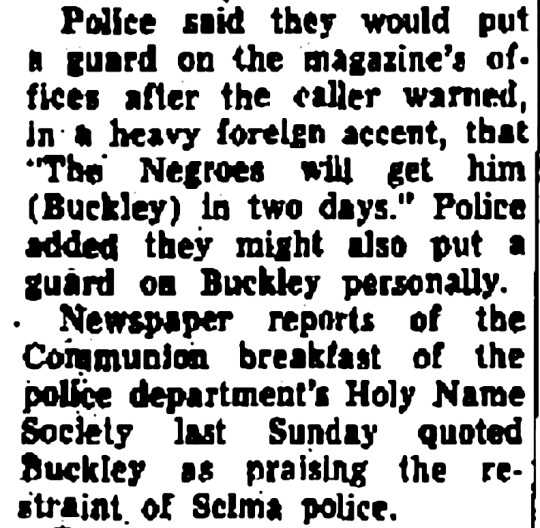

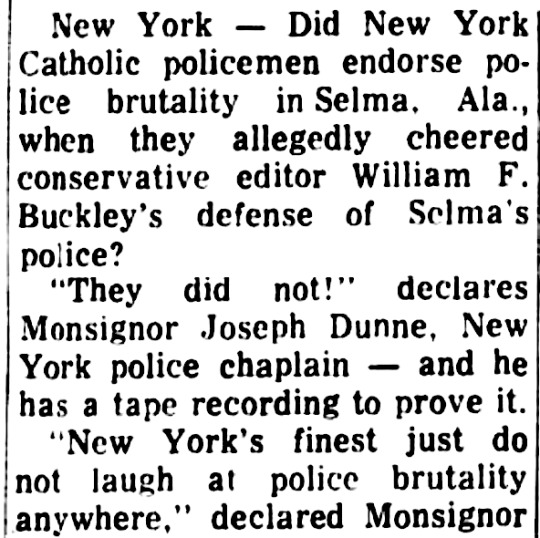
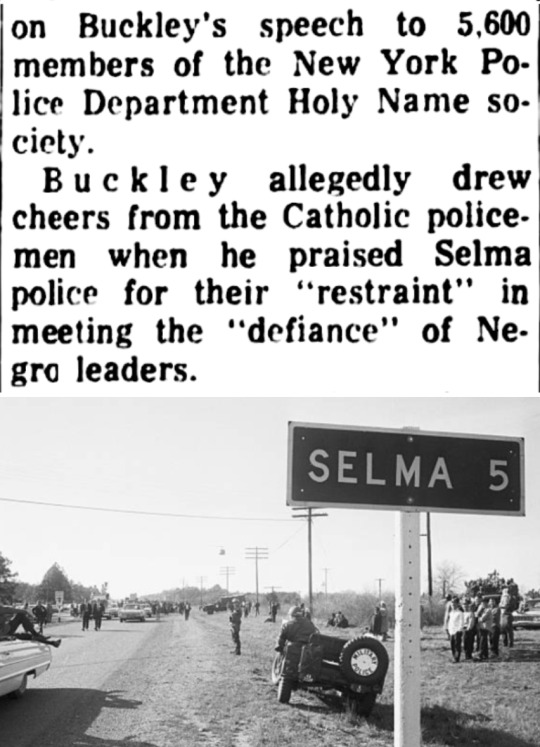
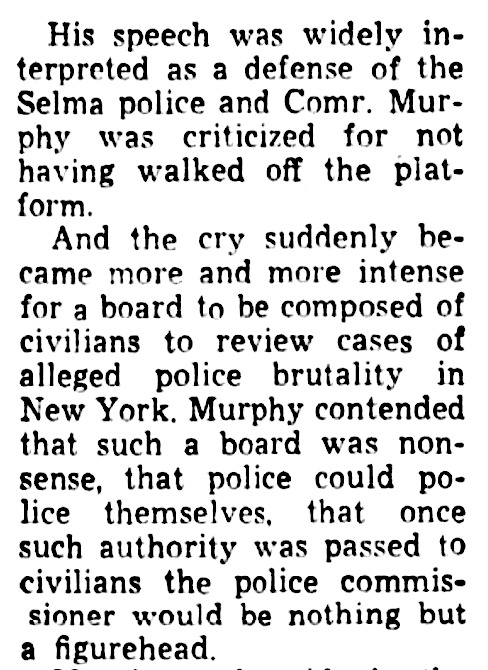
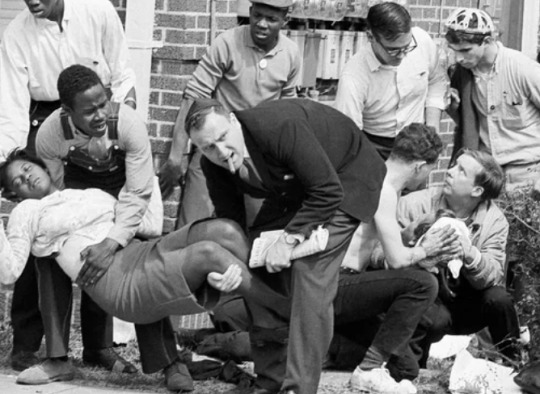
1965.
Conservative mouthpiece William F. Buckley said the police brutality against Civil Rights Marchers in Selma, Alabama was justified.
73 notes
·
View notes
Text

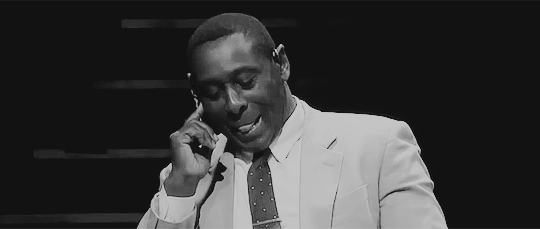





Charles Edwards and David Harewood in the Olivier-nominated Best of Enemies at the Young Vic, directed by Jeremy Herrin (2021-22)
#charles edwards#david harewood#gore vidal#william f buckley jr#best of enemies#theatreedit#young vic theatre#off west end
46 notes
·
View notes
Photo

Amber Heard, (Instagram, January 04, 2020)
—The Fire Is Upon Us: James Baldwin, William F. Buckley Jr., and the Debate Over Race in America, Nicholas Buccola (2019)
#amber heard#the fire is upon us#The Fire Is Upon Us: James Baldwin William F. Buckley Jr. and the Debate Over Race in America#Nicholas Buccola#books#celebrities
10 notes
·
View notes
Text
Gay-bashing on the political right particularly pained Liebman, and in his letter in [American "conservative" magazine] National Review he writes that "in many years of service to The Cause I've sat in rooms where people we both know _ brilliant, thoughtful, kind people _ have said, without any sense of shame, vulgar and cruel things about people who through no fault of their own happen to be different in their sexuality."
His decision to come out, he writes, was motivated partly "because I fear that our cause might sink back into the ooze in which so much of it rested in pre-(National Review) days . In that dark age the American right was heavily, perhaps dominantly, made up of bigots, anti-Semites, anti-Catholics, the KKK, rednecks, Know Nothings, a sorry lot of public hucksters and religious medicine men."
Now, Liebman writes, "too many of our friends have recently used homophobia to sell their newsletters, or to raise money through direct mail for their causes and themselves."
-- from a 1990 WaPo article on right wing fundraiser and agitator Marvin Liebman's (1923-1997) public coming out letter, published in bff William F. Buckley Jr.'s National Review
#marvin liebman#william f. buckley jr.#gay republicans#spoiler: the gop picked homophobia over loyal friend marvin#the dark age of the 1950s#not like the enlightened#united states right wing#of the 1990s#or now#self-serving deluded distinctions#leopards faces etc
1 note
·
View note
Text
I am obliged to confess I should sooner live in a society governed by the first two thousand names in the Boston telephone directory than in a society governed by the two thousand faculty members of Harvard University.
William F Buckley Jr.
0 notes
Text
Watch "James Baldwin v. William F. Buckley (1965) | Legendary Debate" on YouTube
youtube
"Has the American Dream been achieved at the expense of the American Negro."
#Youtube#james baldwin#william buckley#william f buckley#william f buckley jr#the american dream#cambridge university#cambridge university debate#1960s#1965#civil rights#cambridge union
1 note
·
View note
Quote
I would like to take you seriously but to do so would affront your intelligence.
Bugs Bunny to Elmer Fudd
0 notes
Text
'Baldwin & Buckley at Cambridge' at the Public, Review
This is one to see for its trenchant themes. James Baldwin holds currency for us today.
Gavin Price in the New York premiere production of Elevator Repair Service’s Baldwin and Buckley at Cambridge at The Public Theater. Photo credit: Joan Marcus.
Baldwin & Buckley at Cambridge, the 1965 debate of James Baldwin and William F. Buckley, Jr. at the Cambridge Union, University of Cambridge, UK is receiving its New York Premiere at The Public Theater. You need to see this production…

View On WordPress
#Ben Jalosa Williams#Elevator Repair Service#Greg Sargeant#James Baldwin#John Collins#Lorraine Hansberry#Public Theater#William F. Buckley Jr.
0 notes
Text
A Futile and Stupid Gesture 2: Bucking the Trend Line
Less a sequel than a second version of A Futile and Stupid Gesture, this one instead focuses on William F. Buckley, Jr.'s time at Yale, through the founding of the National Review, up until the SEC crackdown on several of his businesses in the late 1970s and early 1980s. And the cast is the exact same cast from the first movie, with everyone taking on different roles, though Will Forte again portrays the writer at the center of the story, in this case Buckley rather than Kenney.
#bad idea#movie pitch#pitch and moan#a futile and stupid gesture#biopic#doug kenney#josh karp#david wain#will forte#national lampoon#national review#writer#conservatism#william f. buckley#william f buckley#william f buckley jr#douglas kenney#yale#yale university
1 note
·
View note
Text
In a 1986 interview, Netanyhu does an amazing job describing himself 37 years later, when asked by the interviewer (William F Buckley Jr.) to define terrorism. At the time he was Israel's ambassador to the U.N.
No one can talk about terrorism better than a terrorist.
#benjamin netanyahu#israeliterrorism#israel#gaza#free palestine#netanyahu a criminal of war#netanyahu#palestine#free gaza#فلسطين#jerusalem#israel is a terrorist state#israel is a war criminal#israelis are terrorists#Israelis are war criminals#i stand with palestine#gaza under attack#gaza under genocide
628 notes
·
View notes
Text
"No fewer than twenty-nine of my [research] cards document [Ronald] Reagan's detachment. He was at once the most remote and the most accessible of men. Although he reveled in the constant flesh-pressing of the Presidency, and ate up flattery with a spoon, he needed regular spells of 'personal time.' Glance through the Oval Office peephole and you would see him happily writing in longhand, always with his tie straight and jacket on, ensconced in an egglike solitude that the curvature of the lens only emphasized.
Adored by so many, he was a man with no real friends. This was not due to any inherent misanthropy...Until he remarried in 1952, earnest, bespectacled Ronnie was said to be 'best friends' with [actor] William Holden, and after that with Robert Taylor. But neither man was more than a barbecue buddy. Hundreds of political supporters and associates claimed to be close to him when he was Governor of California and thousands during his Presidency. Former Senator Paul Laxalt spoke for all of them when he said, 'I guess I know Ronald Reagan as well as anybody. Of course we never talk about anything personal.'
Sooner or later, every would-be intimate (including his four children, Maureen, Michael, Patti, and Ron) discovered that the only human being Reagan truly cared about (after his mother died) was Nancy. For Laxalt, disillusionment came when the President called to thank him for his campaign help in 1984, only to pause in midsentence and audibly turn over a page of typescript. For William F. Buckley Jr., it was when Reagan showed polite relief at his inability to accept an offer of hospitality. For Michael Reagan, it was the high-school graduation day his father greeted him with 'My name is Ronald Reagan. What's yours?'
Patti Davis, Reagan's younger daughter, writes in her 1992 autobiography:
'Often I'd come into a room and he'd looked up from his notecards as though he wasn't sure who I was. [Youngest son] Ron would race up to him, small and brimming with a child's enthusiasm, and I'd see the same bewildered look in my father's eyes, like he had to remind himself who Ron was...I sometimes felt like reminded him that Maureen was his daughter, too, not just someone with similar political philosophies.'
Reagan's scrupulously kept Presidential diary is remarkable for a near-total lack of interest in people as individuals. In all its half-million or so words, I did not find any affectionate remark about his children. He conscientiously named every visitor to the Oval Office, having a printed schedule to refer to, but in conversation he tended to rely on pronouns. Nor did he pay much attention to faces. 'Nice to meet you, Mr. Ambassador,' he greeted Denis Healey, the former Defense Minister of Great Britain, while the real British Ambassador stood by. 'But I've already met him,' his Excellency [the Ambassador] complained, 'eleven times.'"
-- Edmund Morris, Ronald Reagan's authorized biographer, on President Reagan's aloof personality, "The Unknowable: Ronald Reagan's Amazing, Mysterious Life," The New Yorker, June 28, 2004.
#History#Presidents#Presidency#Presidential History#Ronald Reagan#President Reagan#Reagan Administration#Presidential Personalities#Edmund Morris#First Families#Dutch: A Memoir of Ronald Reagan#Quotes About Presidents#The Reagan Diaries#Patti Davis#Reagan Family
53 notes
·
View notes
Text
"The largest cultural menace in America is the conformity of the intellectual cliques which, in education as well as the arts, are out to impose upon the nation their modish fads and fallacies, and have nearly succeeded in doing so. In this cultural issue, we are, without reservations, on the side of excellence (rather than 'newness') and of honest intellectual combat (rather than conformity)."
William F Buckley Jr. (1925-2008) American Conservative commentator and publisher
80 notes
·
View notes
Text
“Life can't be all bad when for ten dollars you can buy all the Beethoven sonatas and listen to them for ten years.” -- William F. Buckley Jr.

Happy belated birthday, Ludwig van Beethoven, born on the 16th of December, 1770
Via The Durham WASP
29 notes
·
View notes
Text
In 1966, William F. Buckley Jr., the founder of National Review, hosted Hugh Hefner, the founder of the wildly successful Playboy magazine, on Mr. Buckley’s weekly public affairs show, “Firing Line,” for a discussion of sexual ethics.
On the show, Mr. Buckley quoted Mr. Hefner as having argued that “man’s morality, like his religion, is a personal affair best left to his own conscience.” With Mr. Hefner dressed in a suit and Mr. Buckley sounding, as usual, like a parody of himself, Mr. Hefner described his view as “anti-puritanism, a response really to the puritan part of our culture.” Mr. Buckley did not like Mr. Hefner. Or, more accurately, he did not like his philosophy.
Mr. Buckley believed that “anti-puritanism” wasn’t just misinformed — he argued, both on the show and in print, that Mr. Hefner’s aim was to shatter the sexual values that he believed were conducive to what Mr. Buckley called a “viable existence.” On “Firing Line,” he sarcastically asked Mr. Hefner if he had “rewritten the ancient theological tablets.” If he had, “Oughtn’t you claim some sort of moral authority to do so, and if so, what is that moral authority?”
Hugh Hefner was a proud Democrat, but his brand of libertinism has jumped parties since that television interview. Sixty years later, in many ways, his view has won over the conservative movement that Mr. Buckley was so essential to. Trying to find a path that includes both defiant hedonism and the moralistic foundations of traditional, Buckleyesque conservatism has emerged as a central challenge of the movement.
Some conservatives seem to have decided that winning over a new constituency — one that hates rules and ordinances and loves hot people and cool ideas and sex, sex and ideally more sex — is worth changing what it means to be a conservative in the first place. Pursuing these voters is a perilous shift for conservatism, because the ethos relies not on a political ideology but on the lack of one: simply doing whatever one wants. A hornier conservative movement might be more electorally successful, but it will run headfirst into a wall of longstanding conservative policy commitments — to end abortion, eliminate pornography and reinforce the “nuclear family.” Goals that are, at the very least, not very horny.
Playboy magazine was marketed to men, and so is this particular brand of politics. Being a horny bro is not terribly unusual, or even bad. In fact, I’d argue that many men fall in this category — heterosexual men who think that liking sex and sexiness are generally good, uncomplicated things, and think that people who tell them that sex or sexiness is bad or sinful or problematic should be mocked or ignored. Some seemed to gravitate toward the ethos of Barstool Sports, the popular sports and betting media conglomerate.
The “Barstool conservative,” as Matthew Walther has argued, isn’t opposed to abortion; he’s opposed to political correctness. Mr. Walther wrote that Barstool conservatives are “people who, with varying degrees of enthusiasm, accept pornography, homosexuality, drug use, legalized gambling, and whatever Gamergate was about.” But what they do not accept, ever, is being told what to do, whether by “hectoring, schoolmarmish” politicians and media or by the federal government. This kind of conservative might not vote, or at least not vote on a consistent basis. But he does adhere to this specific, attitudinal type of politics. As my colleague Ross Douthat wrote in 2014, “This attitude is ‘liberal’ in that it regards sexual license as an unalloyed good, and treats any kind of social or religious conservatism as a dead letter. But at the same time it wants to rebel and lash out against the strictures it feels that feminism and political correctness have placed on male liberty, male rights.”
When the Supreme Court overturned Roe v. Wade last year, Barstool’s founder, Dave Portnoy, jumped on an “emergency press conference” on Twitter, saying: “It makes no sense how anybody thinks it’s their right to tell a woman what to do with her body. I just don’t get it. To take away the ability to make informed decisions on how they wanna live their lives is bananas.” Under the philosophical construct of horny bro-dom, the idea is that abortion isn’t good or bad, but it is an act that a woman wishes to commit, and nobody should tell anybody else what to do, or what not to do. In fact, in 1992, Bill Clinton (a noted horny bro) said something very much the same in a National Abortion Rights Action League survey: “The government simply has no right to interfere with decisions that must be made by women of America to make the right choice.”
Many conservatives disagreed with Mr. Portnoy on abortion (Mr. Portnoy declined my request for an interview). But they seemed to channel the “horny bro” perspective on a raft of other issues. While some conservatives want to ban pornography, others would welcome porn-film stars at right-wing conferences. In this, there’s been a subtle warping of the conservative movement as it sounds increasingly less like itself and more like its horny, libertine opposition, in the pursuit of electoral gains and cultural relevance.
The debate that Mr. Hefner and Mr. Buckley had about politics in the 1960s has become a defining question for the conservative movement: whether conservatism is a project intended to get people to do something (even things they do not wish to do) or to protect people from being told what to do.
There is a conservatism of ideology and the “three-legged stool” and there is a conservatism of “feels,” so to speak, a conservatism that doesn’t really care about tax credits or ethanol policy but has a distinct sense that there used to be something better than there is now and that what is to come is likely to be worse. But what if what used to be was something more libertine? What if some conservatives aren’t longing for Ronald Reagan’s heyday but for the time when women were hotter, you could put up a topless calendar in your cubicle at the office without fear of reprisal from some mean H.R. lady, and nobody told you what to do?
This has created peril for traditional Republicans. Attempting to come across as the “cool mom” of political persuasions — do whatever you want, just do it at home, and ideally, do it in a way that owns the teetotaling libs — is not the natural affect of movement conservatives.
And so some conservatives, unable or unwilling to adopt the type of horny-bro aesthetic that embraces sports, sex and generally letting “you do you” (provided you avoid making him do pretty much anything), have resorted to a paint-by-numbers anti-feminism. Conservative women are hot, The Federalist says! Single women are pathetic cat ladies, too ugly to love, say two actual members of Congress! It’s a strange interpretation of masculinity, as if learned from old issues of Maxim and a particularly bitter next-door neighbor. (Magdalene Taylor, who writes about sex and culture, told me she was reminded of a 2003 article in Maxim magazine titled “How to Cure a Feminist,” showing a step-by-step guide to make a masculine-presenting woman into a femme sex goddess, willing to wear tight tank tops and perform fellatio with abandon. This is how a swath of right-wing internet sounds pretty much all the time.)
Some conservatives have always attempted to hedge their bets: The same year that Mr. Buckley noted the availability of Penthouse magazine as a general indicator of increased “sexual permissiveness” that had caused a “rise in disease or death,” he also wrote a story for the publication (the piece was about the Rev. Jesse Jackson’s presidential candidacy and headlined “Jesse Jackson’s Jive”). But there is no true way to bridge the divide between enforcing ideas and rejecting all enforcing.
I was thinking about this when I saw that the right-wing commentator Candace Owens had issued an awkwardly lukewarm defense of Andrew Tate, the kickboxer turned men’s-rights guru, who was recently accused of human trafficking offenses and rape in Romania. She argued that perhaps he was being railroaded by the media for his anti-feminist views. Perhaps he isn’t a rapist, she said, because “that is what people like to accuse men of when they’re trying to take them down, right?” She went on to say he was “up front” about his outlook on life and women, like a “modern Hugh Hefner.” It was a fascinating attempt at needle threading for a right-wing audience more disposed to an anti-feminist “horny bro” aesthetic than a defense of social conservatism: Sure, Mr. Tate might be bad if the allegations of human trafficking are true, but he’s not nearly as bad as the media for saying that doing so is wrong.
The life span of horny-bro conservatism is inherently limited by the very nature of what it means to be either a horny bro or a conservative — at a certain point, one viewpoint may overpower the other. But it seems as if attracting the horny bro to the Republican Party is increasingly more important than sating the conservative, particularly when it comes to getting voters. When the Bang Girls (of Bang Energy drinks) threw cash at conservative teenagers at a Turning Point USA youth conference in 2020, some elders argued that it was embarrassing and deplorable, far removed from “conservatism.” But one Twitter user responded to the Republican political strategist Alec Sears’s denunciation of the event, saying that perhaps the message was actually incredibly effective: “hot women and money. Being conservative will help you achieve those things. that’s what it has to do with it, that is the implication. Join us and get those things.” William F. Buckley would be horrified. Hugh Hefner would be proud.
13 notes
·
View notes
Text
[serophobia, forcible tattooing cw]
anyway just so we're all on the same page this is what i personally think of when i see the name william f. buckley (jr.):
which is an op-ed from 1986 in which he argues:
Everyone detected with AIDS should be tatooed [sic] in the upper forearm, to protect common-needle users, and on the buttocks, to prevent the victimization of other homosexuals.
(i knew about this in general terms, but i was like, you know what, let me hunt down the actual article, just to be sure i'm being fair and accurate in my condemnation; and it really is a classic NYT special, in that at first he defines two opposing schools of thought on the issue, and you think, oh, okay, we're Taking Pains to Be Even-Handed; but then you get to the end of the piece and realize, oh, never mind, school B is just—what you personally are in fact advocating for!)
#so like. not exactly a Historic Public Intellectual i'd personally be chomping at the bit to name myself after#and i will personally be sourcing my recipes elsewhere
29 notes
·
View notes